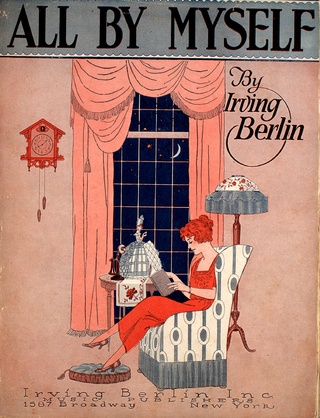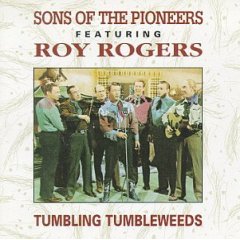Related Research Articles
"No Other Love" is a show tune from the 1953 Rodgers and Hammerstein musical Me and Juliet.
"All I Do Is Dream of You" is a popular song. The music was written by Nacio Herb Brown, the lyrics by Arthur Freed. The song was published in 1934. It was originally written for the Joan Crawford film Sadie McKee (1934) when it was played during the opening credits and later sung by Gene Raymond three times. It was also sung in the film by Earl Oxford in a show. The song is also featured in the films Singin' in the Rain, A Night at the Opera, The Affairs of Dobie Gillis, and Crimes and Misdemeanors.

"A Fine Romance" is a popular song composed by Jerome Kern with lyrics by Dorothy Fields, published in 1936.
"The One I Love (Belongs to Somebody Else)" is a popular song composed by Isham Jones with lyrics by Gus Kahn. The song was recorded by Isham Jones' Orchestra on December 21, 1923, at Brunswick Studios in New York City, and published on January 7, 1924. On January 17 in Chicago, Jones recorded another version, with Al Jolson on lead vocals. Both versions made the charts that Spring, with Jolson's peaking at number 2, and Jones' at number 5. Sophie Tucker recorded her version February 1924, released on Okeh 40054.
"This Can't Be Love" is a show tune and a popular song from the 1938 Rodgers and Hart musical The Boys from Syracuse when it was sung by Eddie Albert and Marcy Westcott. The lyrics poke fun at the common depiction of love in popular songs as a host of malignant symptoms, saying, "This can't be love because I feel so well."
"I May Be Wrong " is a popular song. The music was written by Henry Sullivan, the lyrics by Harry Ruskin, arranged by Dan Daugherty, and the original music publisher was Ager, Yellen, and Bornstein, Inc. The song was published in 1929 and it was included in the musical revue Murray Anderson's Almanac which ran for 69 performances at Erlanger's Theatre on Broadway in 1929. It is said that the song was written on-demand for John Murray Anderson.

"Somebody Loves Me" is a popular song, with music written by George Gershwin, and lyrics by Ballard MacDonald and Buddy DeSylva. The song was published in 1924 and featured in George White's Scandals of 1924.

"Manhattan" is a popular song and part of the Great American Songbook. It has been performed by the Supremes, Lee Wiley, Oscar Peterson, Blossom Dearie, Tony Martin, Dinah Washington, Ella Fitzgerald, and Mel Torme, among many others. It is often known as "We'll Have Manhattan" based on the opening line. The music was written by Richard Rodgers and the lyrics by Lorenz Hart for the 1925 revue Garrick Gaieties. It was introduced by Sterling Holloway and June Cochran.
"Isn't It Romantic?" is a popular song and part of the Great American Songbook. The music was composed by Richard Rodgers, with lyrics by Lorenz Hart. It has a 32-bar chorus in A–B–A–C form. Alec Wilder, in his book American Popular Song: The Great Innovators 1900–1950, calls it "a perfect song."
"I've Got a Crush on You" is a song composed by George Gershwin, with lyrics by Ira Gershwin. It is unique among Gershwin compositions in that it was used for two different Broadway productions: Treasure Girl (1928), when it was introduced by Clifton Webb and Mary Hay, and Strike Up the Band (1930), when it was sung by Doris Carson and Gordon Smith. It was later included in the tribute musical Nice Work If You Can Get It (2012), in which it was sung by Jennifer Laura Thompson. When covered by Frank Sinatra he was a part of Columbia Records.
"I'm Putting All My Eggs in One Basket" is a popular song written by Irving Berlin for the 1936 film Follow the Fleet, where it was introduced by Fred Astaire and Ginger Rogers. Astaire had a huge hit with the song in 1936 and other popular versions that year were by Jan Garber and by Guy Lombardo.
"I Wish I Were in Love Again" is a show tune from the 1937 Rodgers and Hart musical Babes in Arms. In the original show, Dolores, the Sheriff's daughter, talks to Gus, her former boyfriend, who tries to woo her unsuccessfully. They then sing about how they do not care that their relationship is over. The song was omitted from the 1939 film version.
"I've Got Five Dollars" is a 1931 popular song composed by Richard Rodgers, with lyrics by Lorenz Hart for the musical America's Sweetheart (1931) where it was introduced by Harriette Lake and Jack Whiting.
"Johnny One Note" is a 1937 show tune from the 1937 Rodgers and Hart musical Babes in Arms, where it was introduced by Wynn Murray. Judy Garland sang it in the Rodgers & Hart biopic Words and Music (1948).
"(You'd Be So) Easy to Love" is a popular song written by Cole Porter for William Gaxton to sing in the 1934 Broadway show Anything Goes. However Gaxton was unhappy about its wide vocal range and it was cut from the musical. Porter re-wrote it for the 1936 film Born to Dance, where it was introduced by Eleanor Powell, James Stewart, and Frances Langford under its alternate title, "Easy to Love". The song was later added to the 1987 and 2011 revivals of Anything Goes under the complete title "You’d Be So Easy to Love".
"My Kinda Love", also recorded as "My Kind of Love", is a popular song with music by Louis Alter and lyrics by Jo Trent, published in 1929. The song was used in the short lived Americana show in 1928.
Bing Crosby recorded the song on three occasions. The first was with the Dorsey Brothers Orchestra recorded on January 26, 1929 for Okeh Records. The writer, Gary Giddins commenting on the session said "Best of all is "My Kinda Love," a flimsy song that he projects stirringly without a trace of the frangible crooning style." Crosby re-recorded the song a few weeks later on March 14, 1929 with a trio for Columbia Records and this was the first occasion that he would be top-billed on a record. In 1954, Crosby recorded the song again for his album Bing: A Musical Autobiography.

"All by Myself" is a popular song written by Irving Berlin, published in 1921.

"Out of Nowhere" is a popular song composed by Johnny Green with lyrics by Edward Heyman and published by Famous Music. It was popularized by Bing Crosby, and was the first recording under his Brunswick Records contract. He recorded it on March 30, 1931 and it became his first number one hit as a solo artist. Crosby also sang it in the film Confessions of a Co-Ed (1931) and in his short film I Surrender Dear (1931). He recorded it again in 1954 for his album Bing: A Musical Autobiography.

"Tumbling Tumbleweeds" is a Western music song composed by Bob Nolan, a founding member of the Sons of the Pioneers. Nolan wrote the song in the early 1930s while he was working as a caddy and living in Los Angeles. It was first recorded by the Sons of the Pioneers in 1934, and it became one of the most famous songs associated with the group. Originally titled "Tumbling Leaves", the song was reworked into the title "Tumbling Tumbleweeds" and into more widespread fame with the 1935 film of the same name starring Gene Autry. Members of the Western Writers of America chose it as one of the Top 100 Western songs of all time.
"Can't We Be Friends?" is a 1929 song with lyrics by Paul James and music by Kay Swift, introduced on Broadway in The Little Show by Libby Holman. It was later recorded by many artists including Bing Crosby, Ella Fitzgerald, and Frank Sinatra.
References
- ↑ "THE ONLINE DISCOGRAPHICAL PROJECT". 78discography.com. Retrieved June 8, 2017.
- ↑ "THE ONLINE DISCOGRAPHICAL PROJECT". 78discography.com. Retrieved June 8, 2017.
- ↑ "A Bing Crosby Discography". BING magazine. International Club Crosby. Retrieved June 7, 2017.
- ↑ "Discogs.com". Discogs.com. Retrieved June 8, 2017.
- ↑ British Hit Singles & Albums. London: Guinness World Records Ltd. 2005. p. 513. ISBN 1-904994-00-8.
- ↑ "Discogs.com". Discogs.com. Retrieved June 8, 2017.
- ↑ "Discogs.com". Discogs.com. Retrieved June 8, 2017.